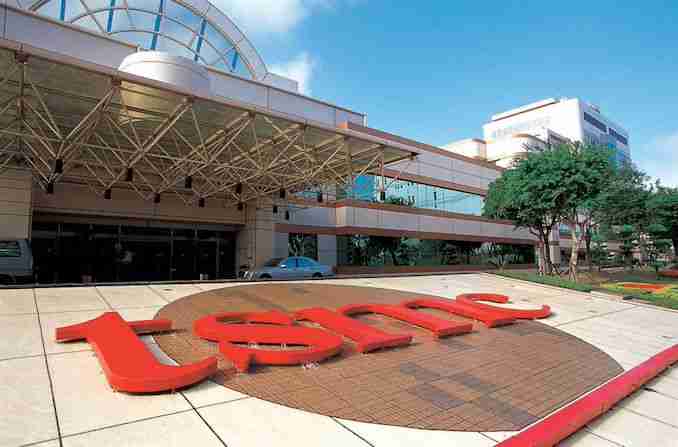
Asian Tech Press (Oct 27) -- As Taiwanese foundry giant TSMC agreed to the U.S. request to provide it with information on semiconductor supply chains, media in mainland China suddenly became agitated and rushed to "take up the cudgels" for TSMC.
Many media outlets commented that TSMC had compromised with the U.S., and even a tech media outlet originating in Silicon Valley asserted that TSMC was falling into the American trap.
1. TSMC agrees to provide data to the US.
It has recently been hotly debated that TSMC has agreed to hand over chip data. And TSMC clarified to state-owned China Securities Journal on Monday that it would not provide confidential data to the US.
The White House held the third semiconductor summit at the end of September, asking global semiconductor industry participants to hand over data about chip inventory, the number of orders and sales records that are considered trade secrets.
As reported by Reuters, executives from over twenty semiconductor-related companies attended the virtual meeting held on Sept. 23, including automakers such as General Motors, Ford, Daimler AG, chip companies like TSMC, Samsung and GlobalFoundries, as well as technology giants like Intel, Apple and Microsoft.
On the second day of the summit, the U.S. Department of Commerce (DOC) issued a Notice of Request for Public Comments on Risks in the Semiconductor Supply Chain, seeking relevant data and information from the global semiconductor industry. And the deadline for the data collection is November 8, 2021.
The Korea Economic Daily cited informed sources in the Korean semiconductor industry on Sept. 26 that information submitted by Samsung and TSMC could be leaked to US-based companies such as Intel, and it would put them at a bargaining disadvantage.
On Oct. 22, Reuters reported that the U.S. DOC said that Intel, General Motors, Germany's Infineon, South Korea's SK Hynix and other companies have agreed to submit chip data, and TSMC is preparing and will respond to its request.
A Commerce spokesperson said, "The (request for information) is voluntary, but this information is crucial to addressing concerns about transparency in the supply chain. Whether or not we have to use compulsory measures depends on how many companies engage and the quality of the data shared."
TSMC said it will submit the information by Nov. 8, Taiwan's Central News Agency (CNA) reported on Friday. Earlier, Sylvia Fang, the company's vice president and general counsel, stressed that TSMC would never leak truly sensitive information, especially customer information.
For TSMC's response, media in mainland China believe that TSMC has succumbed and compromised. And they said that TSMC, dubbed as Taiwan's "sacred mountain", has fallen into the American trap and become its next target. after Toshiba, Alstom and Huawei.
In response, TSMC clarified to state-owned media outlet China Securities Journal on Monday that it would "actively cooperate and provide support to all interested parties," but "has not and will not provide confidential data."
2. TSMC has more than half of the global semiconductor foundries market.
TSMC was founded in Taiwan in 1987 by Morris Chang, who had worked for Texas Instruments Inc (TXN:NASDAQ) in the United States for 25 years.
As the world's leading chip company, TSMC now has a market capitalization of over $550 billion, and is the chip foundry with the highest market value in the world.
According to a report released by TrendForce, TSMC ranked first with a 52.9% market share and $13.3 billion in revenue in the second quarter of 2021.
South Korean semiconductor maker Samsung, which ranks second in market share, is far behind Taiwan's TSMC, accounting for 17.3% of the global foundry market share, and has said it will try to close the gap with TSMC by 2025.
And TSMC is also now actively advancing its semiconductor manufacturing process. At a recent earnings briefing, TSMC President and CEO C.C. Wei revealed that the 3nm process will be in trial production this year and will be in mass production in the second half of next year. And the company's 2nm process is expected to be in mass production in 2025.
The Taiwanese newspaper DigiTimes published a report in July comparing the chip manufacturing processes of Intel, TSMC and Samsung, and said that in terms of transistor density, TSMC's 5nm process is predicted to reach a density of 173 million transistors, while Samsung's 5nm process can only reach that of 127 million transistors, much lower than Intel.
However, at its second-quarter earnings meeting in July this year, Intel announced that its 7nm node was delayed until the end of 2022 or early 2023. This also means that Intel is now far behind TSMC and Samsung in terms of current chip processes.
3. Chinese media believe TSMC has fallen into the American trap.
Since the U.S. government held a meeting at the end of September to ask the global semiconductor industry to hand over chip data, all parties are watching how the situation progresses. In particular, Taiwan-based foundry giant TSMC has been the focus of attention in this event.
Last Friday, the news suddenly broke out that TSMC intends to submit data to the United States, which has sparked a heated debate in mainland China.
TSMC has made a statement on the U.S. request in early October, saying that "the U.S. is publicly requesting information on semiconductor supply chains, mainly to address supply chain issues," and that "TSMC is still evaluating the information required by the U.S. DOC and will not provide sensitive information."
The statement in mainland China did not raise too much concern. It was only a few days ago that the news that TSMC was making preparations to hand over the data, as mentioned in a Reuters report, sparked a lot of discussion by media in mainland China.
The China Securities Journal, a subsidiary of state-run Xinhua News Agency, published TSMC's latest response on Monday morning, saying, "The company offers active cooperation and support to all interested parties for a long time to overcome the challenges in global semiconductor supply."
"But confidential data has not been and will not be provided. As the company's chief legal officer said recently, TSMC will not provide confidential data, let alone do anything to harm the rights of its customers and shareholders," TSMC emphasized in the statement.
The official media outlet described TSMC's response as a "decisive clarification". While another wave of mainland Chinese media criticized TSMC's promise to hand over data as a compromise, submission, "conceding" and "surrender" to the United States. Even more, TSMC is considered to be "falling into the American trap."
PingWest, a leading Chinese technology media outlet, published an opinion piece titled "TSMC is falling into the 'American trap'" on the same day that TSMC made its response.
The article mentioned that after TSMC handed over its data, its confidential business data would be controlled by the U.S., which "would seriously infringe on the business interests and trade secrets of mainland Chinese chipmakers."
Moreover, the media outlet commented that the moment TSMC hands over its data, it "will no longer be trustworthy."
Public information shows that PingWest was founded in 2012 in Silicon Valley, positioning itself as "a voice for the global tech community". And the tech media outlet was sued by LeTV in 2017 for questioning Faraday Future founder Yueting Jia's "selling dreams to make money".
In addition, PingWest has been facing a lawsuit by Tesla for cyber torts at the beginning of this year, because it commented that "the Tesla Shanghai factory has degenerated into a blood and tears factory."





